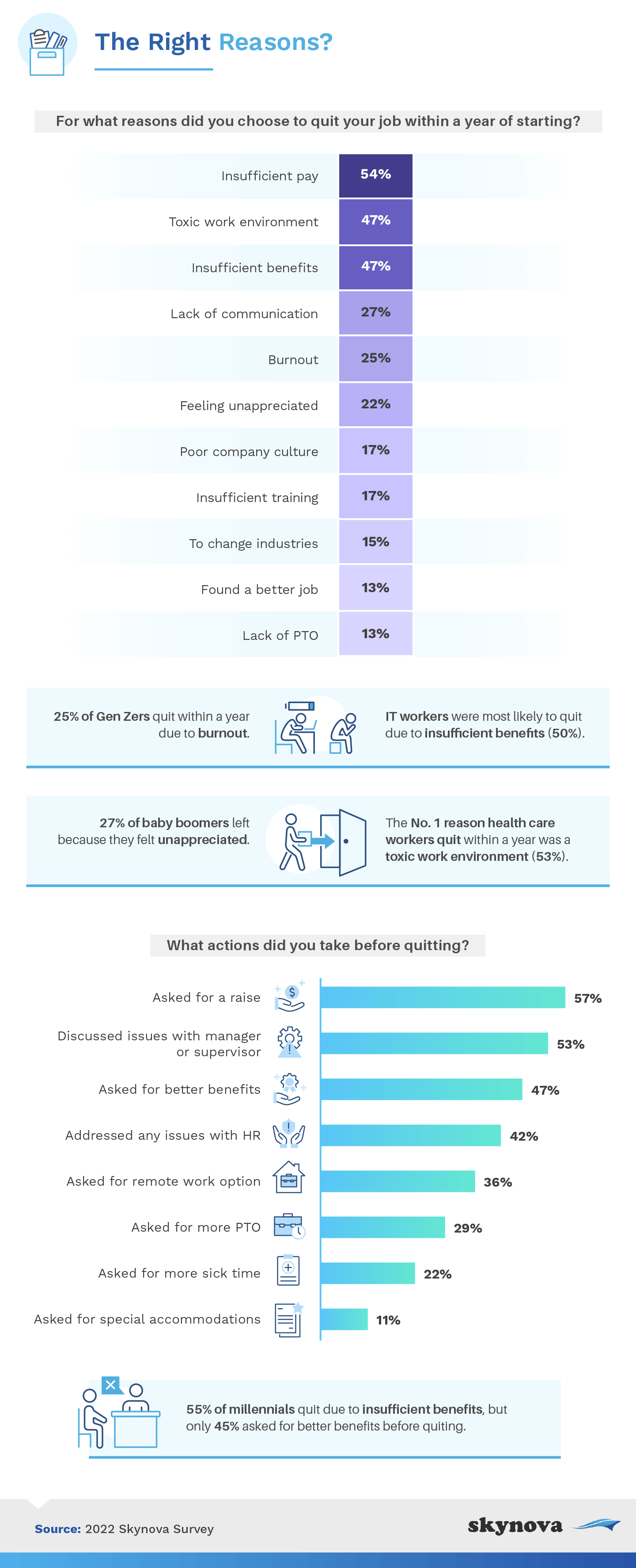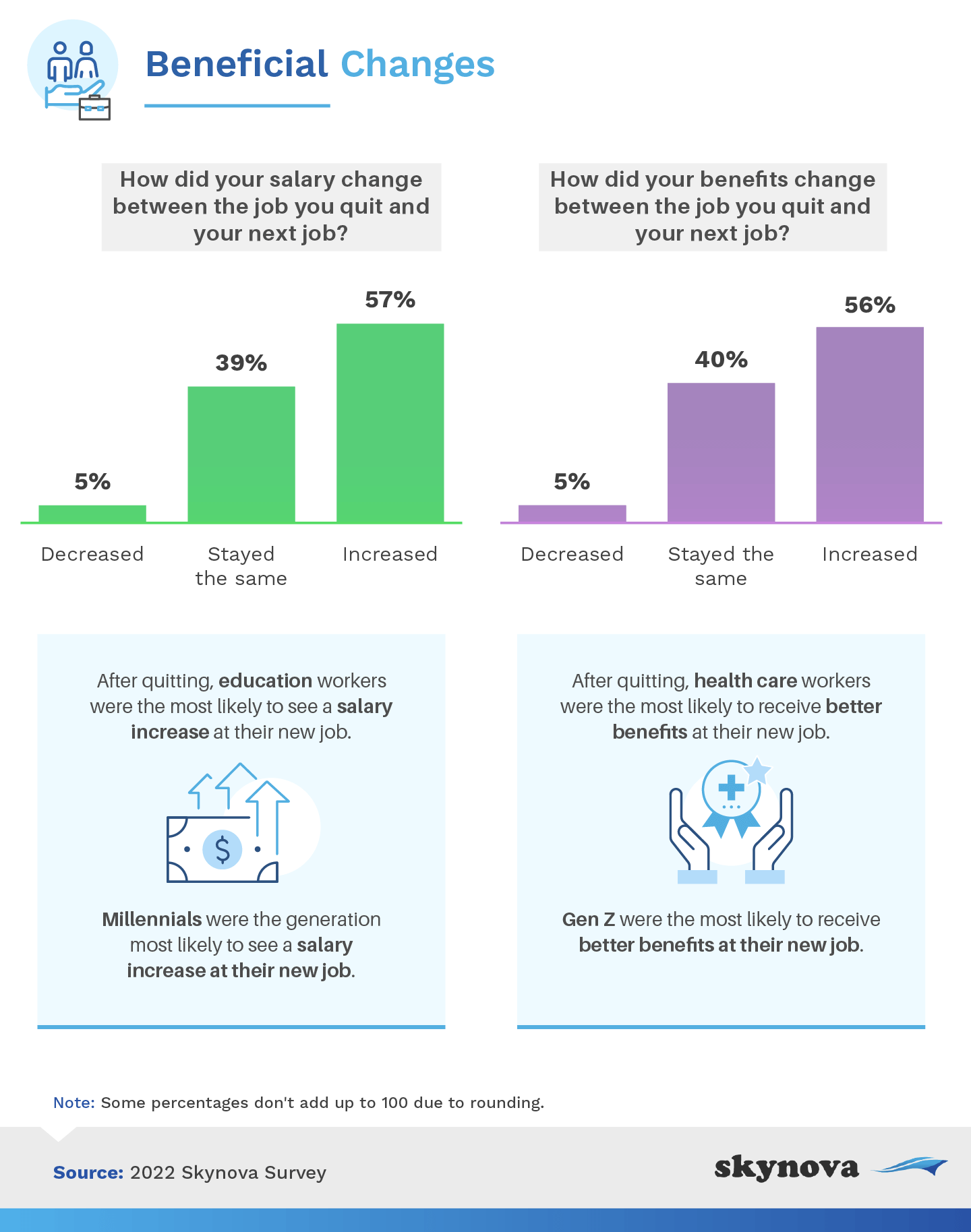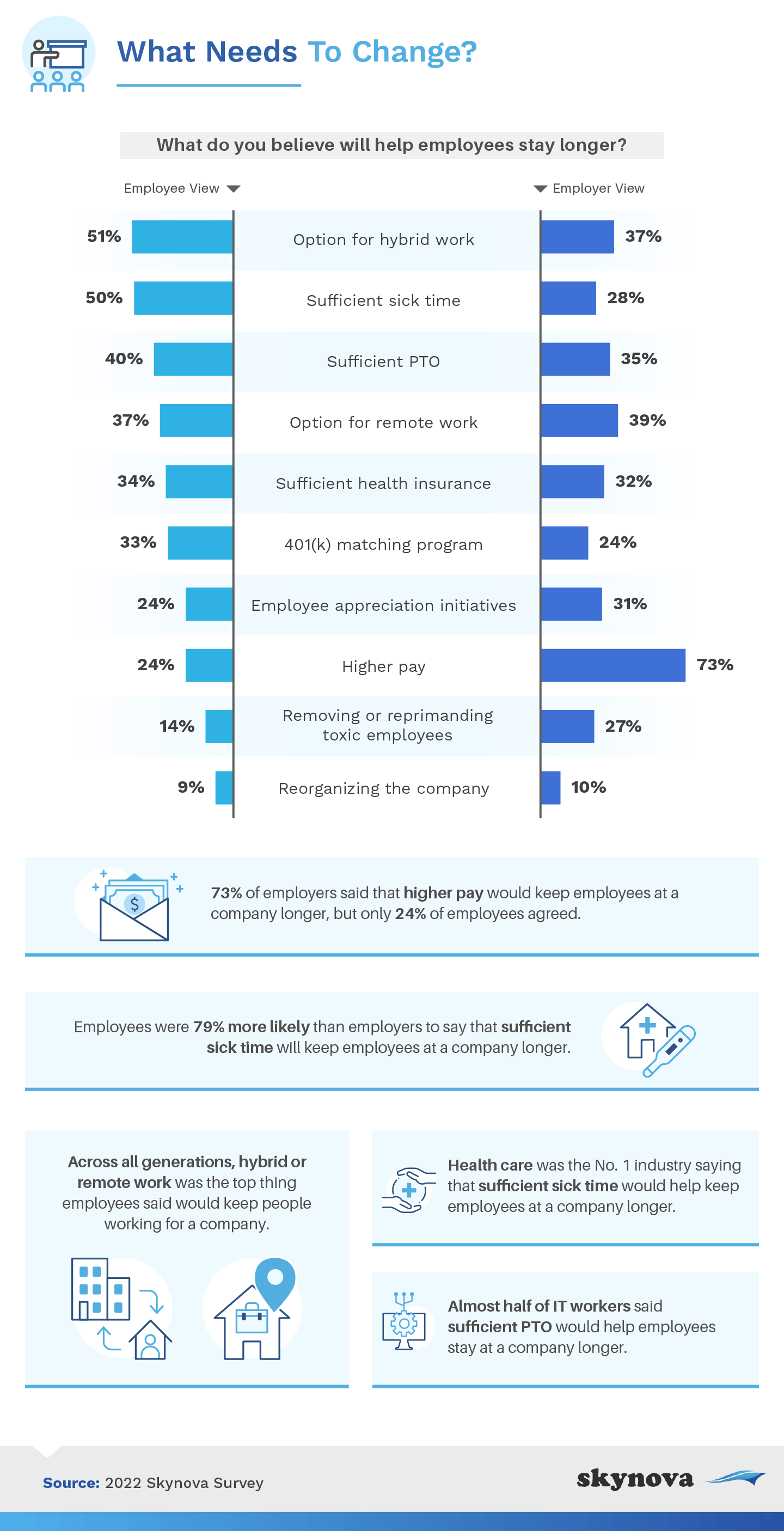
|
The workplace has forever changed due to the COVID-19 pandemic and its lasting effects. While "quiet quitting" worried managers earlier this year, there's now a new catchphrase to learn: quick quitting.
Quick quitting refers to the practice of an employee leaving a job they've held for less than a year. Employees quickly leave jobs for several reasons, including insufficient pay, toxic work culture, and poor communication. What are these quick quitters doing after they've left their jobs? And how can companies stop quick quitting in its tracks?
Skynova surveyed 500 employees and 632 managers and HR professionals about quick quitting and what they believe will help prevent it.
When hired, most people don't envision leaving a job as quickly as possible. So, what goes wrong that leads employees to do so? We asked employees why they quit their jobs in under a year and what actions they took before they put in their notice.

Perhaps unsurprisingly, the No. 1 most common cause of quick quitting was insufficient pay, with 54% of quick quitters citing this reason. Even more employees (57%) asked for a raise before they quit, showing they were interested in staying for the right price. Clearly, pay is a significant issue, especially with inflation rising at record speed this year. A toxic work environment (47%), insufficient benefits (47%), and a lack of communication (27%) were the next most common reasons for quick quitting.
Why people quit and the actions they took before doing so differed between generations. One-quarter of Gen Z respondents quit due to burnout, while 27% of baby boomers left a job because they felt unappreciated. And although 55% of millennials quit due to insufficient benefits, only 45% asked for better benefits before putting in their notice.
Employees in different industries also quit for different reasons. For example, IT workers were the most likely to quit because of insufficient benefits, with 50% of IT quick quitters naming this as their reason. Meanwhile, the top cause of quick quitting for health care workers was a toxic work environment (53%), which many of them have likely dealt with during the COVID-19 pandemic.
Some quick quitters tried to address their problems with their employers before quitting. In addition to asking for better pay and benefits, quick quitters discussed their issues with a manager (53%) or HR (42%), asked for remote work options (36%), or requested more paid time off (29%).
Many quick quitters left their jobs in under a year because of insufficient pay and lack of benefits. Next, we'll see if these things changed once they found a new job.

Sometimes, it's worth it to move on from a job or workplace you're not happy with. The majority of the quick quitters surveyed found better pay and benefits at their next job; 57% of quick quitters said their salary increased after quitting, while 56% got better benefits. However, a large proportion found their salary or benefits stayed the same between jobs; 39% said their pay didn't change, and 40% had similar benefits at their new job.
Success in finding better pay and benefits also varied between generations. Millennials were the most likely to earn more money at their new job, whereas Gen Zers were the most likely to receive better benefits. Because Gen Z is the youngest generation, perhaps they're more likely to be working their way up to full-time roles with better benefits than their previous internship, entry-level, temp, or part-time positions.
Additionally, outcomes regarding salary and benefits differed between fields of work. Health care workers were the most likely to receive better benefits at their new job. Meanwhile, education workers were the most likely to receive a salary increase. Educators have been quitting in droves this year due to stress and inadequate compensation, so it makes sense that a higher salary was top-of-mind.
Quick quitters often leave their jobs to find better pay and benefits and frequently succeed in their efforts. So, how can managers and employers ensure they keep their employees around for longer than a year and put an end to quick quitting?

To learn what needs to change, we asked employers and employees what they believe will encourage workers to stay at a company. A comparison of their viewpoints yielded some interesting data. Across all generations, hybrid or remote work were the top things employees said would keep people working for a company.
But while 51% of employees thought having the option for hybrid work would prevent quick quitting, only 37% of employers agreed. Instead, most employers (73%) believed higher pay would make employees stay longer, compared to just 24% of employees. Workers were much more likely to name benefits, such as 401(k) matching, PTO, and health insurance, as reasons to stay.
One of the biggest discrepancies on this topic between employers and employees was sick time. Employees were 79% more likely than managers and HR professionals to say that sufficient sick time would keep employees working for a company. Health care was the No. 1 industry that said adequate sick time would be the best way to retain employees. Meanwhile, almost half of IT workers said sufficient PTO would help prevent people from quitting.
Quick quitting has been around forever; it's not uncommon to leave a job as soon as you discover it's not a good fit — especially if you're burnt out after a short time working there. But perhaps quick quitting has become more common due to employees feeling empowered to ask for sufficient pay, benefits, and flexibility in the wake of the Great Resignation.
Employees are most likely to leave due to insufficient pay and benefits, lack of remote work options, poor communication, and toxic work environments. Employers and employees don't always see eye-to-eye on what would keep employees for longer. To prevent quick quitting, employers may need to keep benefits and the workplace environment at the forefront of their retention strategies.
Skynova provides online software for invoicing, accounting, timesheet management & more for small businesses. Our purpose is to streamline their processes so they can grow to their full potential.
Skynova surveyed 500 employees and 632 managers/HR professionals about "quick quitting," their experiences with it, and what they believe will help stop it.
If you found our findings on quick quitting insightful, we encourage you to share the results of our study for any noncommercial use. We simply ask that you include a link back to this page in your story, so they can access our full findings and methodology.